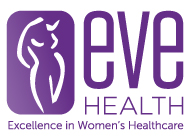From the moment you arrive at Eve Health you will experience a warm welcome and friendly service.
Our obstetricians are compassionate and experienced, and provide individualised care for all pregnant women, including women with twins and pre-existing medical conditions.
Your schedule of antenatal visits may vary and can depend on your pregnancy, your previous history and your obstetrician. Most women will have their first appointment between 7 and 10 weeks for a dating scan where you will see your baby for the first time. You will receive requests for early blood testing and the opportunity to discuss screening tests for your baby. Of course, you are welcome to come and see us earlier than 7 weeks if you like.
Following your first visit, you will usually see your obstetrician every four weeks until Week 28, every two weeks from Week 28 to 36 and then weekly from 36 weeks. Of course, this might be modified depending on your pregnancy and any concerns that might develop.
One of the Eve midwives will meet with you for two routine scheduled appointments. These are usually around 16 weeks and again around 34 weeks. These appointments are between 20 – 40 minutes in length and cover common pregnancy concerns, diet, exercise and offer another opportunity to answer any questions or concerns that you may have.
Pregnancy Ultrasound Demonstration
Our midwives run an Eve Antenatal Education Program and our Eve Parents’ Group.
- Our Antenatal Education sessions are hosted in the Eve boardroom to help you prepare for parenthood. We have general birthing classes every fortnight, small group caesarean classes monthly and individual education options. Click here or on the banner below for more information on Antenatal Education.
- Parents’ Group meets every Tuesday at 9:30am at The Bistro at Victoria Park golf course and all mums, including those with second and third or more babies are welcome to come along for the friendship, support and midwife led discussion. Parents’ Group is fun, friendly and supportive. Click here for more information on Parents’ Group.
Physiotherapy
Physiotherapy helps women with some of the physical discomforts and physical stress that can occur during pregnancy. It can also assist women with postnatal care. Your Eve Health obstetrician or midwife may suggest you visit one of our affiliated physiotherapists. Some of the most common pregnancy-related conditions and advice that a physiotherapist can help you with include pelvic, back or neck pain, pelvic floor muscle strengthening and abdominal instability and muscle separation. Click here for more information about physiotherapy.
Private Cord Blood and Cord Tissue Storage
Your baby’s cord blood is a rich source of stem cells. Cord blood is used as an alternative to bone marrow transplants for life threatening conditions such as blood cancers, immune conditions and metabolic disorders. Conditions include leukaemia’s, lymphomas and solid tumours.
Storing cord blood could provide access to potential future treatments for your family.
Cord blood can be collected at birth by a trained Cell Care Collector or your Eve obstetrician. To learn more request your free information pack by following this link Cell Care Information Portal
Meet Our Experienced Obstetricians
Meet Our Dedicated Midwives
Related Blog Posts
Comments are closed.

